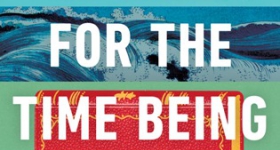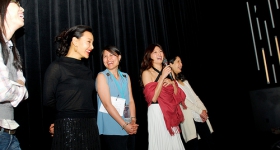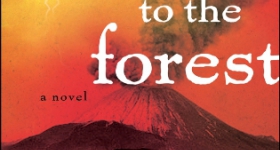With Hyphen’s books section writers being a discriminating, bullheaded bunch, it was not easy to compile this list. Some friendships were lost. Many egos were bruised. There were insults, there were sneers. But somehow, we managed over bottles of red wine and cheese (ok, ok, it was over some cans of Pabst and nachos) to agree on our faves below. We hope you follow our advice and treat yourself to some good reading, you deserve it. And if you’d like to comment and add a few picks of your own, our bookshelves will thank you.
Fiction:
Gold Boy, Emerald Girl (Random House)
by Yiyun Li
MacArthur Genius Award recipient Yiyun Li’s collection of short stories delves into the lives of characters afflicted by terrible loss and longing. From “Kindness,” about a lonely mathematics teacher who reminisces about past loves, among them a People’s Liberation Army lieutenant and a literature professor, to “Prison,” about an older couple’s search for a surrogate mother in China after their daughter’s accidental death from a car crash, each story traces the emotional and physical lengths that human beings will go to in order to find resilience and restore hope. Li’s writing is simple storytelling at its best through stunning sentences and sage understanding.
Snakes Can't Run: A Mystery (Thomas Dunne Books)
by Ed Lin
The second in Lin's detective novel series, Snakes Can’t Run stars seventies-era New York Chinatown cop Richard Chow who discovers the dead bodies of two Chinese men beneath the Brooklyn Bridge underpass. His investigation uncovers an entire operation run by “snakeheads” who smuggle Chinese men and women illegally into the U.S. and force them into indentured servitude until their passage debts are paid off. Cho’s findings hit close to home, as they lead him to suspect Chinese-American community leaders and more dangerously, his own family. Soon, his mission morphs into avenging his own illegal immigrant father. Chow’s book gives a terrific sense of the era and milieu, and proves to be a page turner from start to finish.
I Hotel (Coffee House Press)
by Karen Tei Yamashita
Karen Tei Yamashita's I Hotel, recently nominated for a National Book Award, is a series of ten novellas set in the San Francisco Bay Area during the late 1960’s and early 1970’s. The novel's cast of characters includes: a Filipino farm worker who claims he was once a chef for John Steinbeck, Mo Akagi, a Japanese American activist modeled after Richard Aoki, and an avant-garde choreographer named Sandy Hu. Many of the characters are tied to the Third World Liberation Front, a coalition of student activists who fought for ethnic studies programs at UC Berkeley and San Francisco State University, or the International Hotel, the residence of elderly Filipino and Chinese men who were forcibly evicted in 1968. Meticulously researched by Yamashita over a period of ten years, I Hotel is a surprising, expansive, funny, and chaotic story of the Asian American movers and shakers of the Civil Rights Era.
How to Live Safely in a Science Fictional Universe: A Novel (Pantheon)
by Charles Yu
Narrator-protagonist Charles Yu is a time machine repairman from Minor Universe 31 searching for his father who vanished after inventing the time machine. Yu lives trapped in a TM-31 Time Travel Device because he has shot his future self dead. His only companions are the neurotic-yet-sexy user interface TAMMY and his ontological dog Ed. Meanwhile, his mother chooses to live in a 60-minute time-loop preparing the perfect dinner for a grateful son. Part autobiography and part time travel manual, the book’s non-linear development is abetted by theorems, diagrams, footnotes, “chronodiegetical schematics,” sketches, and the occasional blank page, along with the speaker’s ruminations on his life and relationships. Exponentially quirky, intelligent, and funny, Yu’s marvelous debut parlays scientific abstractions into philosophical inquiries into destiny versus free will, past versus future, and how human beings live always on the cusp of hope and regret.
Non-Fiction:
Half the Sky: Turning Oppression into Opportunity for Women Worldwide (Vintage)
by Nicholas D. Kristof and Sheryl WuDunn
The first married couple to win a Pulitzer Prize for their work for The New York Times, Kristof and WuDunn make a persuasive call to place economic and educational resources in the hands of women and girls. The journalists take on a range of stories of women young and old: sex trafficking in Southeast Asia and the young girls who boldly escaped and started their lives anew, micro-financing institutions which fund women's projects in Pakistan, and the grassroots efforts to fund girls' education in Zimbabwe and Ghana. "We hope to recruit you," write Kristof and WuDunn,"to join an incipient movement to emancipate women and fight global poverty by unlocking women's power as economic catalysts." Sounds to us like just the goal for 2011.
The Emperor of All Maladies: A Biography of Cancer (Scribner)
by Siddhartha Mukherjee
Cancer physician and researcher Siddharta Mukherjee’s epic work chronicles the scientific, social, and political history of what is now the second-leading cause of death in the U.S. Drawing from ancient Greek theories of cancer to present-day advancements, Mukherjee tracks the efforts of pioneers in all their brilliance, and in some cases, their folly, along with changing public perceptions of the disease. There is William Steward Halsted, for example, the cocaine- and morphine-addicted doctor who erroneously advocated radical mastectomy for all breast cancer diagnoses including early detections, and the partnership of oncologist Sidney Farber and philanthropist Mary Lasker, whose efforts in the 1970’s garnered increased research funding and eradicated the social stigma that once accompanied cancer illness. Elegantly written and thoroughly researched, Mukherjee’s book is filled with remarkable stories and profound insight.
The Master Switch: The Rise and Fall of Information Empires (Knopf)
by Tim Wu
Coiner of the term “net neutrality,” Columbia law professor Tim Wu issues strong and convincing warning against the looming end of an open Internet system. By surveying the histories of communication technology companies, such as AT&T and Paramount Pictures, Wu posits that the Internet’s future may fall victim to the “Kronos effect” of behemoth companies devouring competition during their fledgling stages in order to build monopolies. Preventative measures, Wu argues, involve maintaining separation between development, infrastructure, and access systems, minimizing government interference, and implementing regulation by the Federal Communications Commission. A sobering and crucial look into the future of the Internet.
Poetry:
Juvenilia (Yale University Press)
by Ken Chen
Ken Chen’s debut collection which won the Yale Series of Younger Poets prize turns to sources as discrepant as Batman, the ancient poet Wang-Wei, his ex, his neighbor, and a host of other unlikely counselors to confront the past, unknowable family secrets, identity, and heartbreak. His search delivers an assemblage of disjointed narratives, syllogisms, aphorisms, elliptical observations, and half-discovered truths. Poetry becomes a way through both loss and revival, a means to “[a]djust your eyes to the unlit room” and “[d]eploy your heart past its range.” Somber yet playful, self-disparaging yet hopeful, the collection brims with the promise of more achievement to come.
Young Adult:
Ash (Little)
by Malinda Lo
A lesbian love story holds the twist in this haunting Cinderella retelling. Lo’s first book opens with the main character Ash and her father grieving over her mother’s death. Her father later remarries and dies in heavy debt, forcing Ash to work in servitude and live with her cruel stepmother and stepsisters. Ash finds refuge in reading the fairy stories her mother once told and escaping to the forest where she meets Sidhean, prince of the fairies, whom Ash implores to take her away into the fairy kingdom. Sidhean ultimately disappoints, and as his character turns dark and sinister, Ash meets Kaisa, the King’s Huntress who teaches her to ride and hunt, and who reawakens Ash’s joy for life. The romance between Ash and Kaisa forms the most touching part of the book.
Illustrated:
The Eternal Smile (First Second Books)
by Gene Luen Yang and Derek Kirk Kim
This collection of three graphic short stories by Eisner Prize winners Yang and Kim explores the different roles that fantasy plays in our lives, from shallow escapism to the most crucial step toward self-realization. Whether about a fairy-tale knight who wins his princess’ hand in marriage, reality-TV show roboticized frogs who start their own religious following, or a meek office employee who falls in virtual love with a Nigerian prince through email exchanges, these tales combine unexpected narrative developments with masterful artwork that draws from Marvel, Disney, and indie comics. Delightful and transporting.









Comments